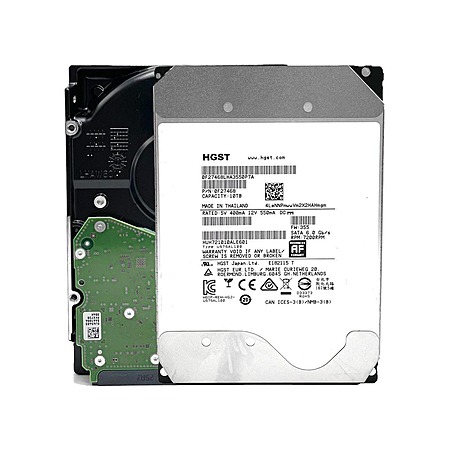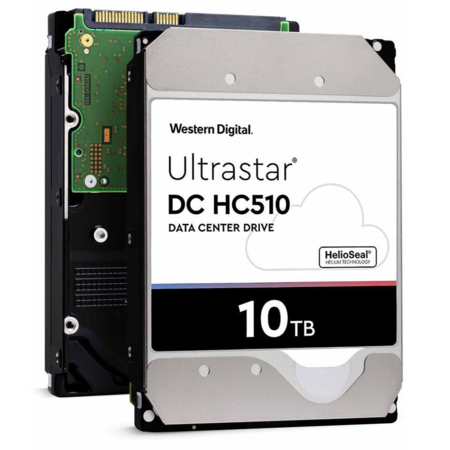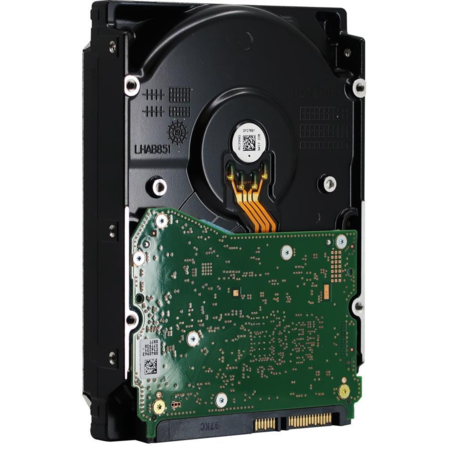expiredsr71 posted Feb 15, 2024 08:20 AM
Item 1 of 3
Item 1 of 3
expiredsr71 posted Feb 15, 2024 08:20 AM
10TB HGST WD Ultrastar DC HC510 3.5" SATA 7200RPM Hard Drive (Refurb)
+ Free Shipping$80
$90
11% offNewegg
Visit NeweggGood Deal
Bad Deal
Save
Share



Leave a Comment
Top Comments
https://www.newegg.com/p/1Z4-001J-00E07
Western Digital's failure rates are astoundingly low.
https://www.backblaze.c
117 Comments
Sign up for a Slickdeals account to remove this ad.
DAS units like that are what most of us do who need multi-drive enclosures but are making our own NAS and don't want to deal with the price/limitations of something from Synology or QNAP.
FWIW, I bought the D4-300 on a deal here because I wanted a box that DIDN'T do RAID on its own. I'm doing drive pooling and snapraid so I don't need or want the box to do it.
This was a recent SD, and would have likely done what you wanted. https://slickdeals.net/f/17313562-terramaster-d5-300c-usb3-0-5gbps-type-c-5-bay-raid-enclosure-support-raid-0-1-single-exclusive-2-3-raid-mode-hard-drive-raid-storage-diskless-expires-2-24-153-99?src=SiteSear
The D5-300c is a unique one, to be sure, but it was cheap and hit the fan requirements and passing of drive info to the host that you had mentioned previously. If someone needs flexible RAID on the box for all 5 drives, I think the TerraMaster D5-300 is the model they'd actually want.
But if you're throwing in the need for "extremely easy and automated" and mixing and matching drive sizes..... you've already eliminated all but a few choices, especially in the turnkey segment.
The D5-300c is a unique one, to be sure, but it was cheap and hit the fan requirements and passing of drive info to the host that you had mentioned previously. If someone needs flexible RAID on the box for all 5 drives, I think the TerraMaster D5-300 is the model they'd actually want.
But if you're throwing in the need for "extremely easy and automated" and mixing and matching drive sizes..... you've already eliminated all but a few choices, especially in the turnkey segment.
They're 7200rpm helium drives in the enclosures, nearly identical to the enterprise drives you are buying. Maybe years ago there were derated spindle speeds, but you cannot find a large drive now that isn't 7200 rpm. They don't have ratings for white-label drives, but the average power draws at idle and during activity are not going to be far off. Enterprise drives are not as power hungry as they used to be. Expect about 6w at idle and approx 8w when active.
I shuck drives and test them in the enclosure before removing them. Anything over approx 12TB is going to be a 7200rpm helium CMR drive. Even under full surface scan read/write, the drives don't generally go above 53 degrees C, they sure as hell aren't cooking in the enclosure, which doesn't even have a fan.
Out of the enclosure and in a standard case (Dell OptiPlex not meant to hold 4+ drives), the drives idle in the low 30s and temps are in the 30s-40s when they're active.
Helium drives are cooler, quieter, and will sometimes use less power than their air counterparts, but the fact is there aren't many air counterparts anymore.
You aren't going to get a very different drive from shucking vs buying retail if you do your HW beforehand. Thats why people shuck. The only negative is that you cannot be SURE of what you'll get and won't have as long a warranty as buying retail (in general).
All my drives are these refurbs and mostly helium because they are used for cold storage because there is no point running anything other than SSD in a desktop, and I have 20TB of that alone.
All my drives are these refurbs and mostly helium because they are used for cold storage because there is no point running anything other than SSD in a desktop, and I have 20TB of that alone.
Based on what exactly?
Because the specs for my 10-14TB drives have an operating temperature range listed up to 65 degrees C based on the spec sheets. Most modern drives, including the HC510 family here, have operating ranges specified in the data sheets up to at least 60 degrees C. They're all fine at 50 degrees.
Besides that, your drives (even in the enclosures) aren't ever normally going to be in the 50s anyway. Note that I said they sometimes get up to 53 degrees C in the enclosure running surface scans with read/write. People don't normally write data to a drive without cessation for over 24 hrs, that's just not a normal use-case scenario beyond testing for infant mortality.
"there is no point running anything other than SSD in a desktop"
Can't argue with you here. Even machines that run databases get SSDs because they're relatively cheap and sooooo much faster. If they die they die, that's what backups are for.
These aren't fancy and quality can be hit or miss, but you're at a low price point for this type of equipment. IMO the TerraMaster units are a step up in quality and reliability, but neither choice is bad so long as you know what you want for your budget.
As soon as you start heaping more demands on the product (speed, RAID flexibility, etc) you simply have to increase the budget to get anything good enough.
Nothing wrong with that and I'm sure you'll be happy with what you have.
Sign up for a Slickdeals account to remove this ad.
Based on what exactly?
Because the specs for my 10-14TB drives have an operating temperature range listed up to 65 degrees C based on the spec sheets. Most modern drives, including the HC510 family here, have operating ranges specified in the data sheets up to at least 60 degrees C. They're all fine at 50 degrees.
Besides that, your drives (even in the enclosures) aren't ever normally going to be in the 50s anyway. Note that I said they sometimes get up to 53 degrees C in the enclosure running surface scans with read/write. People don't normally write data to a drive without cessation for over 24 hrs, that's just not a normal use-case scenario beyond testing for infant mortality.
"there is no point running anything other than SSD in a desktop"
Can't argue with you here. Even machines that run databases get SSDs because they're relatively cheap and sooooo much faster. If they die they die, that's what backups are for.
And one could argue for used drives the other way, that because they've survived X amount of years without issue, they're past the infant mortality period and more likely to trudge on without a problem.
both dead in a week
both dead in a week
Could have been shipping damage. I have had that happen with Newegg shipping drives banging around a big box. I'm somewhat surprised any hard drive survives shipping. All the big shippers like UPS, Fedex, USPS, toss and drop boxes. It's horrific to watch.
1) SATA interface
2) USB port using SATA-to-USB adapter
?
Leave a Comment